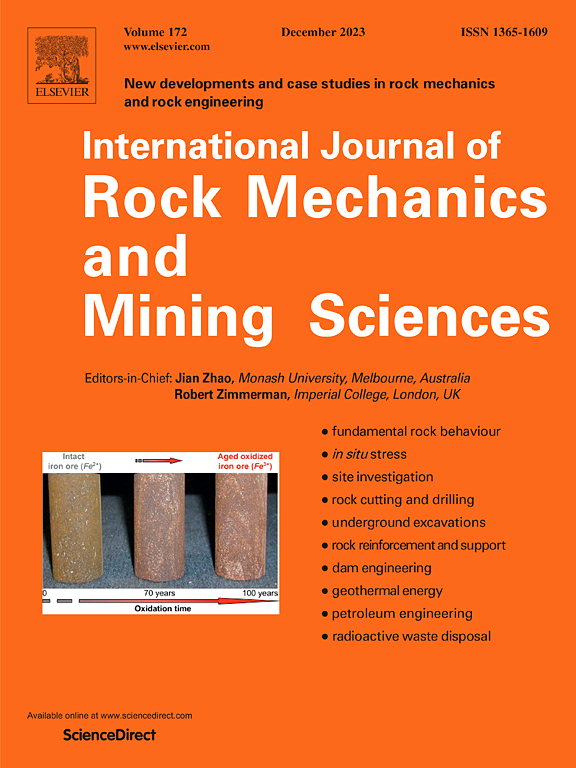Geothermal fluid extraction and injection-related fracture slip susceptibility and seismicity in naturally fractured rocks
IF 7
1区 工程技术
Q1 ENGINEERING, GEOLOGICAL
International Journal of Rock Mechanics and Mining Sciences
Pub Date : 2024-10-28
DOI:10.1016/j.ijrmms.2024.105939
引用次数: 0
Abstract
Understanding fracture slip susceptibility in geothermal reservoirs is central to the control of fluid injection-induced seismicity. To investigate the role of regional fracture systems on induced seismicity, a coupled thermo-hydro-mechanical (THM) model containing fracture networks was developed, which features direct coupling between different physics for explicit fractures, fractured rocks (porous matrix blocks with small-scale fractures) and their interactions, as well as indirect coupling through changes of material properties, such as stress-dependent fracture and rock permeabilities. The model was applied to simulate geothermal fluid extraction and re-injection in a natural fracture system comprised of three dominant fracture sets at the Hellisheiði geothermal field over a 10-year period (2011–2021), utilising field recorded monthly production and re-injection rates. Based on the model results, the slip susceptibility of regional fracture systems was examined under reservoir conditions before and after the start of fluid re-injection across different time scales, i.e., over short (1 month), intermediate (1 year) and long-term (10 years). Two model scenarios, one with cooling contraction and one without, were considered to examine the relative contribution of cooling contraction and fluid overpressure on fracture slip susceptibility. Results have shown that fracture networks act as preferential fluid flow paths that influence fluid pressure and stress distribution and fracture slip susceptibility in geothermal reservoirs. NE-SW and N-S trending fractures at Hellisheiði are susceptible to slippage before the start of fluid re-injection. During fluid re-injection, the distribution of fractures with enhanced slip susceptibility gradually shifts from surrounding the re-injection region to forming a two-lobed pattern in the fault-normal direction around the re-injection region, indicating the dominant role of cooling contraction over fluid overpressure on the fracture slip susceptibility in the intermediate- and long-term.
与地热流体抽取和注入有关的天然裂隙岩断裂滑移易感性和地震性
了解地热储层中的断裂滑移易感性是控制流体注入诱发地震的核心。为了研究区域断裂系统对诱发地震的作用,开发了一个包含断裂网络的热-水-机械(THM)耦合模型,该模型的特点是显性断裂、断裂岩石(具有小尺度断裂的多孔基质块)及其相互作用的不同物理特性之间的直接耦合,以及通过材料特性变化(如应力相关断裂和岩石渗透率)的间接耦合。该模型利用现场记录的月生产量和再注入率,模拟了十年期间(2011-2021 年)Hellisheiði 地热田由三个主要断裂组组成的天然断裂系统中的地热流体抽取和再注入情况。根据模型结果,研究了在不同时间尺度(即短期(1 个月)、中期(1 年)和长期(10 年))的流体再注入开始前后的储层条件下,区域断裂系统的滑动敏感性。为了研究冷却收缩和流体超压对裂缝滑移敏感性的相对影响,考虑了两种模型方案,一种是有冷却收缩的方案,另一种是没有冷却收缩的方案。结果表明,断裂网络是流体流动的优先通道,影响着地热储层中的流体压力和应力分布以及断裂滑移易感性。在开始重新注入流体之前,Hellisheiði 的东北-西南和北-南走向断裂容易发生滑移。在流体再注入过程中,滑移易感性增强的断裂分布逐渐从再注入区域周围转移到再注入区域周围的断层法线方向上,形成两叶状,这表明在中期和长期内,冷却收缩对断裂滑移易感性的影响要大于流体超压。
本文章由计算机程序翻译,如有差异,请以英文原文为准。
求助全文
约1分钟内获得全文
求助全文
来源期刊
CiteScore
14.00
自引率
5.60%
发文量
196
审稿时长
18 weeks
期刊介绍:
The International Journal of Rock Mechanics and Mining Sciences focuses on original research, new developments, site measurements, and case studies within the fields of rock mechanics and rock engineering. Serving as an international platform, it showcases high-quality papers addressing rock mechanics and the application of its principles and techniques in mining and civil engineering projects situated on or within rock masses. These projects encompass a wide range, including slopes, open-pit mines, quarries, shafts, tunnels, caverns, underground mines, metro systems, dams, hydro-electric stations, geothermal energy, petroleum engineering, and radioactive waste disposal. The journal welcomes submissions on various topics, with particular interest in theoretical advancements, analytical and numerical methods, rock testing, site investigation, and case studies.

 求助内容:
求助内容: 应助结果提醒方式:
应助结果提醒方式:


